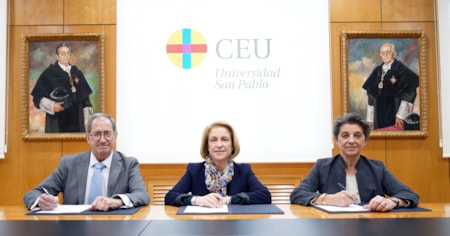
The University and the Spanish Society of Low Vision and Visual
Rehabilitation Specialists (SEEBV) have signed a framework agreement to
complement the training of students on the Optics and Optometry degree
courses. The agreement was signed by Ernesto Marco, President of the
SEEBV; and Rosa Visiedo and Carmen García de Elías, Rector and
Manager of the University, respectively. The event was also attended by the
Secretary General of the SEEBV, Ana Martínez; the Vice-Rector for
Research, Agustín Probanza; the Vice-Dean of the School of Pharmacy, Mª
Pilar Ramos; the Director of the Degree in Optics and Optometry, Sara
Bueno; and the person responsible for the subject of Low Vision on the
degree, Esther Mármol.
Within this framework, a specific agreement was signed for the creation
of a superior programme in Low Vision exclusively for students of the
Degree in Optics and Optometry, as a supplement to their training, with a
curriculum complementary to that taught in the subject of Low Vision. Likewise,
as a result of this collaboration, training courses in this discipline will be
held periodically and the International Congress for Low Vision will be held at
the Montepríncipe Campus, in which third and fourth year students will actively
participate by preparing a visual abstract for the academic section.
What is Low Vision?
Low vision refers to a visual
impairment where an individual has a visual acuity of less than 30% (in the
better-seeing eye and with optimal correction) or a visual field of less than
20 degrees, down to a level of less than 10%, which is considered legal
blindness. People with low vision retain what is known as "residual
vision", which can be improved or optimised through the use of optical and
non-optical aids, followed by visual rehabilitation. The goal is to enable
patients to resume at least some of the activities they may have had to
abandon.
Low Vision also refers to the
optometric specialisation focused on identifying how to make the best use of a
patient’s residual vision. Through a tailored assessment and intervention
process, professionals seek to improve the individual’s quality of life,
enabling them to carry out everyday tasks through refractive correction and
rehabilitation.
In Spain, approximately two million
people are affected by low vision. Of these, 75% are over the age of 45, which
highlights the growing need to train specialists in Low Vision and Visual
Rehabilitation ( ophthalmologists, optometrists, and therapists). These
professionals play a key role in helping such individuals make the most of
their remaining vision.
About the Spanish Society of
Specialists in Low Vision (SEEBV)
The Spanish Society of Specialists in
Low Vision and Visual Rehabilitation aims to raise
awareness of low vision, the available aids, and visual rehabilitation to
improve the quality of life of visually impaired individuals. It also promotes
the dissemination of technical and scientific advances among the wider
population through activities related to visual health promotion, education,
research, and all aspects related to the planning, management and evaluation of
healthcare actions related to Low Vision.